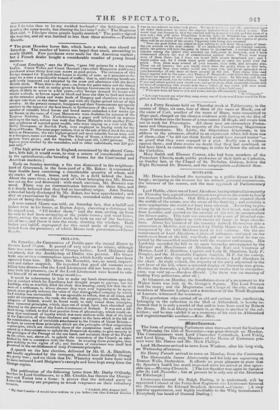f" The great Howden horse fair, which lasts a week,
was closed on Saturday. The number of horses was larger than usual, amounting to nearly 10,000. Few purchases were made for the American market ; but a French dealer bought a considerable number of young brood mares-- ",Count Esterhazy," says the Times, "gave 150 guineas for a floe young bunter. Count Wrbna and Count Hunyadi (two other Hungarian noblemen) purchased about thirty first-rate mares at good prices. The extension of this foreign demand for English-bred horses is worthy of note, as it promises to be. came for a time a considerable branch of traffic ; that is, until foreign breeds are sufficiently improved and extended by the cross and admixture with the finest British stuck. When this is the case,—as, from the pains taken aud the liberal encouragement as well as outlay given by foreign Governments to promote the object, is likely to occur in a few years,—this foreign demand for horses will receive a check, as horses equal in blood and bone can then be bred and reared on the extensive plains and waste lands of Hungary and elsewhere at a much cheaper rate than on the dearer lands and with the higher-priced labour of this country. At the present moment, foreigners and their Governments are equally emulous in the itnport of the best breeds in furtherance of this end. The large number of valuable blood horses and brood mares embarked a few weeks ago for Russia in the name of Count Matuszewic were doubtless fur account of the Emperor Nicholas. The Yorkshire:non, a paper well informed on matters relating to the turf, notices last week that Baron Maltzahn with another Prus- sian gentleman of reputed great wealth, who were staying on a visit with Mr. Beillty Thompson, at Escriek Park, were employed in buying stock for the King of Prussia. The same paper notices, that at the sale of blood stock the week before at Doncaster, the two -highest-priced and most valuable horses were sold to a foreigner, name not stated. For The King of Rome, a three-year old, 450 guineas were given ; and for Snyder., a four-year old, 1,000 guineas. The highest price ti:tched by the remainder, sold to other individuals, was 230 gui- neas only."
[The high price of corn in England, occasioned by the absurd Corn- laws, bids fair, it would seem, to stop a source of considerable profit to the agriculturist—the breeding of horses for .the Continental and American markets.]
Early on Sunday morning, a fire was discovered in the neighbour- hood of Gravesend, in the farm-yard of a Mr. Baker: it consumed a large double barn containing a considerable quantity of wheat, and six stacks of wheat, beans, and hay, in a field behind the barn. About the same time, a large stack of wheat belonging to a Mr. Brown was set on fire and destroyed : with much exertion, Mr. Brown's was saved. There was no communication between the three fires, and it is firmly believed that they had an incendiary origin. John Norton, a thresher lately discharged by Mr. Baker, has been apprehended ; and after an examination by the Magistrates, remanded under strung sus. picion of being the culprit.
A num named Moore was told, on Saturday last, that a bailiff and broker were in his house, at Burton Joyce, executing a distrinyas for his unpaid rent. " I'll broker them," said the man, getting up from the seat he had been occupying at the public-house; and went home, where, seeing the tnen at their work, he took up one of the beehives, full of bees, and threw it into the room, shutting the window. Both broker and bailiff, unprepared for this novel mode of settling rent, rn,bed from the premises; of which Moore took possession.—Chester


























 Previous page
Previous page